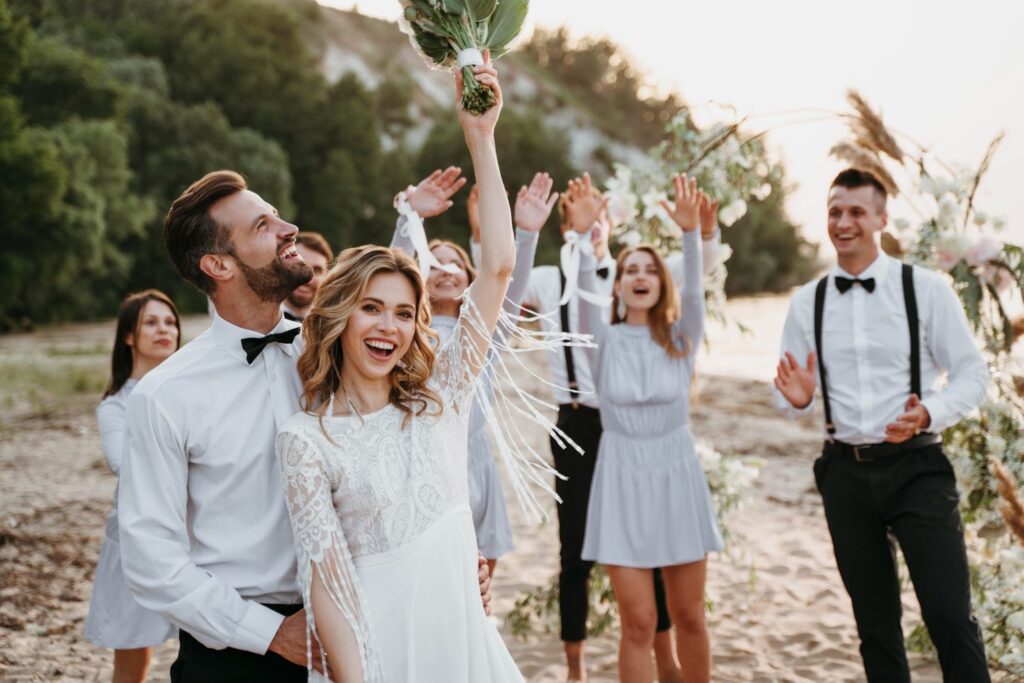Marriage customs have undergone substantial transformations over time, mirroring the evolving societal norms and values. A prominent shift involves the rising acceptance and popularity of unconventional officiants, like close friends or family members, overseeing wedding rituals. This departure from the traditional clergy-led ceremonies raises thought-provoking inquiries regarding the legal, cultural, and personal consequences of entrusting a friend with officiating a wedding.
This piece delves deep into the dynamics associated with having a friend preside over a wedding ceremony. We investigate the legal prerequisites and considerations, the emotional significance for the couple and their inner circle, and the broader societal currents propelling this trend. By scrutinizing the roles, duties, and hurdles encountered by non-traditional officiants, our aim is to shed light on the burgeoning inclination towards personalized and meaningful wedding rituals.
Join us on this exploration as we navigate the intricate landscape of friendship-based officiation, unveiling the factors molding contemporary wedding customs.
The Complex Decision: Who Will Officiate Your Wedding Ceremony?
Deciding on every intricate detail of wedding planning involves a multitude of choices, one of which is settling on the person who will officiate the nuptials. For some couples, it’s an intimate and personal manner of approach to ask a dear friend or a close family member to perform this dignified role.
If this possibility resonates with your plans, you are at the perfect starting point by landing on this article. Moreover, if the wedding is to be held in the picturesque state of Pennsylvania, this article is a treasure of insights and recommendations that you might find incredibly useful.
Involving a confidante in the form of a friend or family member to officiate the wedding often lends a touching uniqueness to the ceremony. As someone with extensive experience in wedding planning, the spectrum of such experiences varies from heartwarming to disappointing, and sometimes, utterly bewildering.
However, it is crucial to bear in mind that despite the best intentions, not everyone is naturally adept at officiating a ceremony. Even those who are truly enthusiastic about the honor can find themselves in choppy waters. Crafting and executing a wedding ceremony that resonates with beauty, grace, and dignity is a task that requires time, experience, and specific talents.
For a person who is venturing into such a role for the first time, particularly in Pennsylvania, it can translate into high-stress levels and potentially, a less than satisfactory performance. Hence, it is vital to consider these aspects while pondering over the decision.
Here are some tips to ensure a smoother process:
- Conduct a thorough discussion with the person you are considering, about the responsibilities and commitment involved in the role;
- Provide them with resources or connect them with professionals who can guide them through the process;
- Practice! A well-rehearsed ceremony can alleviate stress and boost confidence;
- Finally, remind them to enjoy the process and the honor of being part of such a special day in your lives.
Remember, a perfectly officiated wedding ceremony is not just about following a script, but about invoking the essence of love, unity, and lifelong commitment.
Unraveling the Wedding Ceremony Master Class: An In-depth Look
The Wedding Ceremony Master Class offers a thorough exploration into the intricate details of officiating a wedding. This comprehensive program embodies three pivotal components:
Component 1: Legalization Process
This portion of the masterclass provides a comprehensive dive into the legal aspect of officiating a wedding. It is designed to aid individuals in understanding the laws governing wedding officiating and the appropriate steps to render the ceremony legal. While online ordination has emerged as a widely accepted legal tool to officiate weddings in many states, it’s worth noting that this is not a universally applicable method.
There exist several states where online ordination performed by a friend can jeopardize the legality of the marriage. A notable example of such a state is Pennsylvania. In this scenario, the Master Class provides alternatives to ensure the legality of the wedding without compromising on the personal touch of having a loved one officiate the ceremony.
Component 2: Crafting the Ceremony
This segment is dedicated to guiding the officiant in shaping a beautiful, resonant, and meaningful ceremony. The process of crafting a ceremony involves choosing the right words, setting the appropriate tone, and ushering in a warmth that establishes an instant connection with the audience.
Component 3: Officiating with Grace
The final part of the Master Class equips the officiant with the necessary skills to conduct the ceremony with grace and poise. This includes practical tips on public speaking, managing nerves, pacing the ceremony, and responding to unexpected situations.
The goal of the Wedding Ceremony Master Class is not only to guide a friend or family member through the officiating process but to ensure they deliver a ceremony that is memorable, moving, and perfectly captures the essence of the couple’s love story.
Tips for a Successful Ceremony
Whether you are the officiant or the couple, here are some useful tips to ensure a successful ceremony:
- Clarify Expectations: Before deciding to have a friend or family member officiate, have a clear conversation about what the role entails and what is expected of them;
- Training: Encourage the chosen officiant to undertake some training, either through a program like the Wedding Ceremony Master Class or through other resources;
- Practice: Nothing beats a well-rehearsed ceremony. Make sure there is enough time allocated to practicing the ceremony as it helps to boost confidence and alleviate nerves;
- Building the Ceremony Together: Since the officiant is likely to be someone close to the couple, involve them in the process of creating the ceremony so it truly reflects the spirit of your relationship;
- Be Prepared for Unanticipated Situations: Unforeseen circumstances can always crop up during a wedding ceremony. Have a backup plan ready for various scenarios to ensure the ceremony goes on smoothly.
By incorporating these tips, the task of having a friend or family member officiate a wedding can move from a stress-inducing affair to a cherished, memorable experience.
Diving Deep into the Wedding Ceremony Master Class: A Thorough Breakdown
The Wedding Ceremony Master Class presents an enriching journey through the steps of officiating a wedding and is divided into three comprehensive modules.
Module 1: Constructing a Touching Ceremony
The initial part of the Master Class is dedicated to constructing a ceremony that beautifully portrays the couple’s love story. Guiding participants through the proven method of Celebrant Alisa Tongg, it aims to equip the friend officiant with the know-how to craft a touchingly heartfelt ceremony.

The module focuses on the essential questions that should be asked to the soon-to-be-wed couple to gather a deeper understanding of their relationship. These pointers would act as the building blocks of a beautiful, simple, yet deeply meaningful ceremony, reflecting the couple’s unique journey together.
The course recommends keeping the ceremony length at approximately 20 minutes, deemed as the ideal duration for striking the perfect balance between inclusive and concise.
Module 2: Gearing up for the D-day
The concluding segment of the class readies the friend officiant for the day of the ceremony. It covers various aspects such as appropriate attire, the ideal time to collect the marriage license, and other essentialities that contribute towards delivering a memorable ceremony.
Master Class students have the flexibility to enroll and complete the class at their own pace, accommodating their individual schedules and timelines. However, it is advised to begin the class a good month or two in advance of the wedding they are to officiate. This provides sufficient time to absorb, comprehend, and apply the lessons learned effectively.
The Road to a Successful Wedding Officiating
Seeking to officiate a friend’s wedding is an undoubtedly warm and personal gesture. However, it also carries immense responsibilities. To ensure a smooth and cherished experience, here are a few additional suggestions:
- Establish Open Communication: Encourage open and constant communication with the couple throughout the process;
- Be Organized: Keep a checklist for every component of the ceremony; it results in efficient planning and execution;
- Stay Calm: No matter the pressure, remember to stay calm and enjoy the process;
- Keep it Personal: Personal touches in the ceremony can make it more meaningful and memorable;
- Be Prepared: Regardless of the preparation, unforeseen circumstances can occur. Always have a backup plan in place.
With this detailed understanding of the Wedding Ceremony Master Class and the application of these tips, the friend officiant will be fully equipped to deliver an unforgettable ceremony. Also, discover the enchanting allure of a Penn Museum wedding, blending history with modern elegance for an unforgettable celebration.
Spotlight: Exploring the Journey of Alisa Tongg
Alisa Tongg is a renowned certified Life-Cycle Celebrant and ordained minister with an enviable track record stretching nearly a decade. With hundreds of positive reviews under her belt, Alisa has confidently left her mark in Philadelphia, New York, and New Jersey’s wedding sphere.
A distinguished alumnus of the Celebrant Foundation and Institute, Alisa’s illuminated career trajectory is a direct reflection of the profound knowledge and specialized training she underwent at her alma mater. The institute’s curriculum instilled in her the expertise to conduct ceremonies for a diverse spectrum of couples, encompassing interfaith, intercultural, or religiously unaffiliated relationships, as well as those with blended families.
Alisa’s recognition as a Certified Celebrant in the esteemed New York Times Vows section is a testament to her professional prowess and dedication. Setting the bar high in her field of specialty, she is spearheading the movement to modernize Pennsylvania’s marriage laws. This initiative advocates for couples’ freedom to choose a legally recognized, personal wedding ceremony that is truly reflective of their unique love story and values.
Adding another feather to her cap, Philadelphia Magazine has recently acknowledged the efforts and success of Alisa Tongg, featuring her in their list of “9 Wonderful Philly-Area Officiants for Your Wedding Day”. This accolade further solidifies her standing as a leading figure in the realm of wedding officiating.
Valuable Insights from Alisa Tongg
Drawing from the inspirational journey of Alisa Tongg, here are a few nuggets of wisdom for those venturing into or existing in the field of wedding officiating:
- Training is Essential: Formal training in a related field can equip you with the necessary skills and knowledge to conduct weddings effectively;
- Diversity is Key: Embrace diversity. Be prepared to conduct ceremonies for a variety of couples, each with their unique cultural, faith, and familial backgrounds;
- Celebrate Personalization: Every couple has a unique story. Personalize the ceremony to celebrate their individuality and love journey;
- Advocate for Change: If existing laws seem outdated or restrictive, do not hesitate to advocate for legal changes that would benefit couples;
- Recognition Will Follow: With dedication and hard work, recognition and accolades will follow, as evidenced by Alisa’s recognition in the New York Times Vows section and Philadelphia Magazine.
As an aspiring or practicing wedding officiant, these insights can provide a roadmap to a fulfilling and successful career in the field.
Conclusion
In conclusion, the evolution of marriage ceremonies to include non-traditional officiants like friends or family members highlights a significant shift in societal values and norms. This trend reflects a desire for personalized and meaningful wedding experiences, as couples seek to create ceremonies that resonate with their beliefs and relationships. The legal, emotional, and cultural implications of having a friend officiate a wedding bring forth complex considerations, but they also contribute to the richness and diversity of modern-day wedding celebrations. As we continue to navigate these dynamics, it’s clear that friendship-based officiation is a powerful symbol of the evolving nature of love, commitment, and partnership in today’s society.
